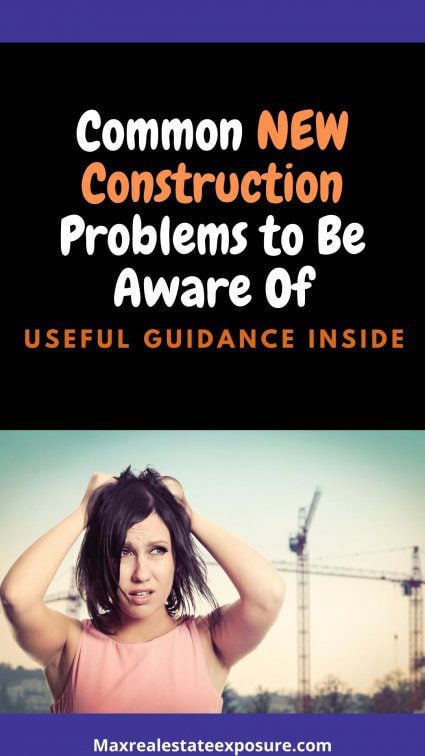Should You Hire a Home Inspector For a New House?
 Should you get a new construction home inspection? When you buy an existing home, a home inspection isn’t a difficult decision. It will make sure you aren’t spending money on a property that will cause you many problems and expenses.
Should you get a new construction home inspection? When you buy an existing home, a home inspection isn’t a difficult decision. It will make sure you aren’t spending money on a property that will cause you many problems and expenses.
But if you are buying new construction, do you really need a home inspection?
Choosing a new construction home inspection isn’t going to be such an obvious decision. After all, everything is new and may have been constructed to your specifications, perhaps even under your supervision.
However, a home inspection for new construction can be a good idea and worth doing. While you will, of course, have the expense of paying the inspector, everything else is a benefit. It will give you peace of mind there are no major issues.
If the inspector does find significant problems, it will be something you want to know about before closing on the home.
Keep in mind new construction inspections may not be commonplace in the area you’re buying. We’ll get into a discussion on that later on.
Let’s take a closer look at the reasons why a new home inspection could be essential and maybe something you shouldn’t skip before committing your escrow funds.
Is a New Construction Home Inspection Included in the Contract?
A final walk-through should be included in the contract when buying new construction, but a professional home inspection is less likely. If it isn’t part of the sales agreement in your case, you should probably add it, and a contingency to protect you should the inspector find issues.
Not every new construction buyer will choose to get a home inspection, but they probably should. Even if you trust your contractor and have been involved with the whole building process, you shouldn’t be complacent.
Ordering an inspection from someone who will be independent is a wise decision when spending so much on your new home. This is good advice whether you buy new construction homes or older properties.
Consider getting a new home inspection, whether a stick-built house, modular home or even a shipping container home.
You Won’t Get a Standard Home Inspection Contingency Like Older Homes
With a resale property, the home inspection contingency clause will typically allow you to escape the contract with your money back. With new construction homes, this is almost always not the case.
Most general contractors will not custom-build a home for you that allows a contingency to escape the sale. That would be financially ridiculous. Reputable builders, however, should allow a licensed home inspector to perform an inspection for “informational purposes only.”
A professional inspector will provide a home inspection report detailing any safety issues, major repairs, and other cosmetic flaws. The home inspection process can not only help you learn about the property but also put together a final punch list.
Municipal Inspectors Will Be Inspecting New Construction Homes
 Most buyers skip a home inspection with a new build because there are municipal building inspections at most phases of construction.
Most buyers skip a home inspection with a new build because there are municipal building inspections at most phases of construction.
For example, municipal inspections will occur when the foundation is completed, when the framing is done, and when the electrical systems and plumbing are roughed in.
These early construction phases are all essential points where an inspection should be conducted.
There may also be a drywall inspection or when the plastering is completed. Municipal inspectors will also come back when the electrical and plumbing is finished.
The inspectors ensure that local building codes are followed, and there are no common problems typically associated with new-construction homes.
When major systems are completed, they are critical points to ensure the property is in good shape.
The good news for a buyer is that they make sure minimum standards are followed. Municipal building inspectors usually do a good job catching any obvious common issues.
Many new home buyers feel confident enough in the local building inspectors to forego a new construction inspection. You may find an independent assessment isn’t necessary for yourself.
Your real estate agent may offer some advice on the reputation of the builder you’re buying from. It’s an excellent idea to have a buyer’s agent when purchasing new construction.
Reasons Why You Should Get a New Home Inspection
There is a greater risk of problems and things breaking when purchasing an older home. While you might expect to avoid issues with something like the plumbing or the electrical problems in new construction, there could still be things wrong, however.
People are only human, and even if your builder is trying to make sure your new home is perfect, mistakes can still happen. Also, your builder will likely subcontract some of the work to other vendors. The work of these subcontractors isn’t necessarily going to be as good as it should be, and mistakes or errors can be challenging to spot.
Problems can also occur when a contractor is rushing to meet a deadline. Perhaps they need to move on to another job and are hurrying to complete your home. But whatever the reason, these errors need to be picked up so that they don’t become your responsibility.
While you might assume your new home is perfect, it might not be the case.
Potential Problems With New Construction
 When an inspector creates a report on new construction, there are certain areas they will pay more attention to. These defects might include:
When an inspector creates a report on new construction, there are certain areas they will pay more attention to. These defects might include:
- Most punch lists for builders include lots of touch-up painting.
- Unfinished construction: something might have been missed in the building process, like missing insulation.
- Damage to the wood siding or exterior walls: the siding could be cracked, wavy, or swell because of moisture.
- Insufficient drainage leads to water damage: correct grading and drainage around the property ensure water doesn’t seep into the foundations.
- Cracking concrete: poorly mixed concrete can lead to shrinkage and cracking.
- Improperly installed plumbing: pipes can be incorrectly hooked up if an experienced plumber hasn’t been hired.
- Heating and cooling: if the HVAC system hasn’t been installed correctly, it could end up costing you a lot more to heat or cool your house than it should do. There may also be undetected gas leaks as part of HVAC issues to check.
- The water heater is not hooked up correctly.
- Construction debris in the ducts: during construction, materials can find their way into ducts and will cause damage to the HVAC system if not properly cleaned before use.
- Cracks in the drywall: after a house has been built, it can take a while for the home to settle, with cracks appearing that need to be repaired.
- Nailheads; nails can be pushed out of the drywall when the wood shrinks.
- Problem floors; water entering the building or simply lousy installation can cause uneven or damaged flooring.
- Incorrectly installed appliances: appliances are one of the last things to be fitted in new construction and could be poorly served in a rush to complete the home.
- Poorly fitted doors: if the doors have not been carefully installed, there could be gaps, or they might not even close correctly, and if this is an outside door, it could be costly to fix.
- Window fittings: windows that have not been installed well could lead to drafts and aren’t going to be cheap to repair.
- Dents in the vinyl siding or garage doors. This is a common defect found in many new homes.
Get Issues Taken Care of Before Closing
These are just some of the potential problems a home inspection for new construction could uncover. Though the downside to a home inspection is the cost at a time when your finances are unlikely to be in the best shape, not having a home inspection could end up costing you more.
Even if you have a warranty from the builder, it will be better to get these things taken care of early on. This will prevent these problems from gradually causing unnecessary damage to the home. You could put your faith in your warranty, but then you’ll have to hope that the damage is fully covered under the terms of the contract.
Sometimes seemingly minor issues, like a fine crack in the driveway, could lead to a bigger problem. This sort of damage could allow water to get into the cement, and if it freezes, it can increase the size of cracks leading to an expensive repair bill.
You’ll also have the hassle of dealing with getting quotes and the inconvenience of contractors on your property. This could create safety and privacy concerns if it happens when you live in the home. Better to deal with these issues before you even move in.
What are the Downsides to Getting a New Home Inspection?
When you consider potential downsides to getting a home inspection for new construction, there’s only one; the cost.
While the expense of getting a home inspection isn’t that large compared to the new construction cost, it can be challenging to find extra funds. Often buying a home, whether new construction or not, pushes people’s finances to their limit.
Even though a new construction home inspection might only cost $400 if you have put all your finances towards the home, you might not have much to spare. When moving into a new home, you’re likely to have many uses for any spare money you have available, so it can be tempting to avoid this expense.
However, it isn’t worth the risk unless you have been very involved in the construction process and are confident you would have noticed problems. Most buyers will not have a detailed knowledge of the construction, so getting a home inspection provides an added level of protection.
Even if you get a home inspection and nothing is wrong with a property, it isn’t a waste as it will reassure you the home is in the condition it should be. That isn’t a bad thing when you are probably making the most significant investment of your life.
The only other potential downside of a new construction home inspection is if the real estate market heavily favors sellers. You might be up against other buyers who decide to waive having a home inspection. Click To TweetWhen is the Best Time to Get Your New Construction Inspected?
 The perfect time to have a home inspection is when all the work is finished, and the builder is ready to get an occupancy permit.
The perfect time to have a home inspection is when all the work is finished, and the builder is ready to get an occupancy permit.
It makes sense to conduct the home inspection process when all of the work is complete. Otherwise, the home inspector won’t know if the final items are adequately done or not.
You should look to schedule the final inspection as soon as construction is completed and after any final approvals have been carried out. But you don’t want to leave it too late. Otherwise, it could delay closing.
Your builder should not have any issues with you requesting a home inspection. If they do, it could indicate some problems with the property they don’t want you to know about.
Builders Typically Fix Any Requested Deficiencies
You would expect reliable builders to stand by the quality of their work, so if they have a problem with a home inspection, this isn’t a good sign.
Having a home inspector go over the property before closing makes sure the responsibility for repairs goes directly to the builder.
If the builders haven’t left the construction site when the inspection takes place, it is clear that it is their responsibility.
And if the contractors are still on-site, it makes it very easy for them to take care of the necessary fixes. There shouldn’t be many negotiations with the builder over issues found in the inspection, either.
There are no mandatory home inspections fixes, however, as long as the builder gets the occupancy permit.
The builder should want to stand by the quality of their work and so will want to make sure their customers are kept happy.
How to Choose a Home Inspector
There are a few ways to go about picking a professional home inspector. The best way is to ask your buyer’s agent for a referral.
If you are not working with a buyer’s agent, you may want to rely on an online search or speak with family or friends who have recently purchased real estate.
When doing an online search, try home inspection near me or home inspectors near me. It is also highly advisable to look for someone who is part of the American Society of Home Inspectors or ASHI for short.
You will increase the odds of having a good inspection as inspectors who are ASHI certified have undergone additional rigorous training.
You Should Be Getting a Builders Warranty
With new construction, there should be a home warranty provided. It is commonplace to have a one-year warranty on all the major systems in the property. Some more prominent national builders may give a more extended warranty than a year.
Some parts of the home may be warrantied for less than a year. For example, some builders may only warranty foundation cracks, settling issues, or painting-related problems for less than a year.
If something is missed at the time of your building inspection, the warranty should ensure the builder will come back to fix the problem. Understanding the builder’s warranty is one of the many questions to ask a home builder before signing a contract with them.
Due Diligence is Still Vital With New Homes
Whether you are buying new construction or an already built home, proper due diligence is essential. Follow the guidance on real estate due diligence to ensure you’re not making a buying mistake.
If you’re not getting financing and are paying cash, you’ll want to have a title search and a land survey to ensure there are no property line violations. There can still be problems other than the building that should be checked on.
There can be property encroachments, whether buying a resale or new construction.
Final Thoughts on New Construction Home Inspections
Even when you are getting a house building loan and customizing your own new build, it makes can be worthwhile to have an inspection when completed.
While you can avoid a home inspection for new construction if you want, it isn’t necessarily a wise idea. The only downside is the expense, but everything else is a positive and should ensure fewer problems with your new home.
Remember, it will be doubtful you can have a home inspection contingency that allows you out of the contract. Hopefully, you now have a much better understanding of what to know about new construction inspections.
About the author: The above Real Estate information on is a home inspection necessary for new construction was provided by Bill Gassett, a Nationally recognized leader in his field. Bill can be reached via email at billgassett@remaxexec.com or by phone at 508-625-0191. Bill has helped people move in and out of many Metrowest towns for 35+ years.
Are you thinking of selling your home? I have a passion for Real Estate and love to share my marketing expertise!
I service Real Estate Sales in the following Metrowest MA towns: Ashland, Bellingham, Douglas, Framingham, Franklin, Grafton, Holliston, Hopkinton, Hopedale, Medway, Mendon, Milford, Millbury, Millville, Natick, Northborough, Northbridge, Shrewsbury, Southborough, Sutton, Wayland, Westborough, Whitinsville, Worcester, Upton, and Uxbridge MA.

